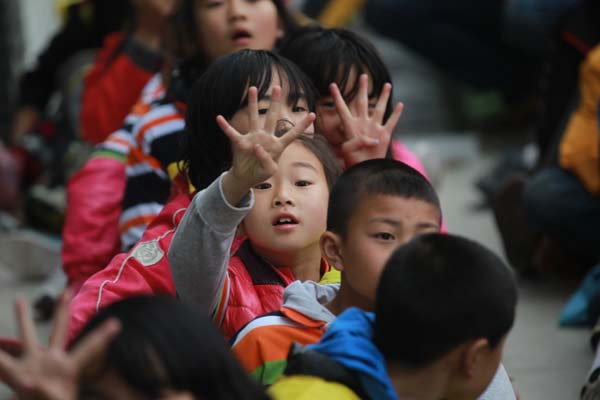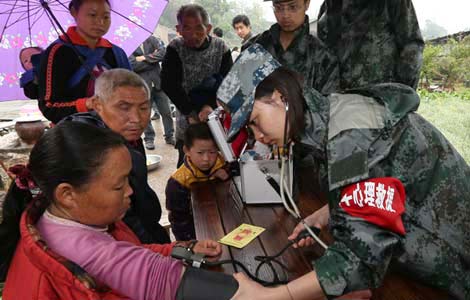
|
 |
|
A group of children play games at a psychological aid site in Lushan county, Sichuan province, on Tuesday. Through the training, volunteers want to encourage the children to be optimistic and confident. CUI MENG / CHINA DAILY |
Psychological help should be offered as soon as possible to people affected by last weekend's earthquake in Ya'an, Sichuan province, according to a senior mental health specialist.
Xi Yingjun, director of the psychological crisis intervention and stress management center at Beijing An Ding Hospital, Capital Medical University, who specializes in mental health, said that since the last major quake to hit the country — the 8.0-magnitude Wenchuan earthquake in 2008, also in Sichuan — emergency relief teams have paid a lot more attention to the mental health responses offered in disaster areas.
Shen Ji, the provincial health chief of Sichuan, said on Monday that mental health intervention will be a major task ahead for the current quake-affected areas.
Mental health specialists have been arriving in Ya'an from around the country to offer professional counseling to survivors and others affected by the disaster, he said.
According to Xi, who has traveled to Ya'an along with two colleagues, the work should focus primarily on vulnerable groups like the injured, surviving family members of quake victims, the old, children, women and the disabled.
In addition, those working closely on disaster relief efforts "including soldiers and front-line medical workers should be given timely psychological help", he told China Daily on Tuesday.
Those exposed to tragic scenarios and distressing scenes, particularly during rescues and medical treatment, were in great need of psychological counseling on how to cope emotionally, he said.
In the early stages of psychological intervention, proper and timely services can help stabilize those living and working in the area, he said.
He added there are three stages of on-site counseling for people affected — observing, listening and connecting.
Service providers usually watch and listen first to understand sufferers' background, their current condition both physically and mentally, and assess their actual needs, he said.
"Psychological intervention should then be delivered once a person's physical safety is fully secured," he added.
Efforts could then be made to ensuring they rebuild their social lives.
"Mutual support within any community which is suffering helps build individual mental resilience to coping with stress after a disaster," he said, highlighting group work and games as useful coping mechanisms.
"Careful assessment should always be carried out first, to help guide the intervention measures," he added.
"At the moment, sufferers need listening, patience and company rather than someone telling them what to do," he said.
Ramsey A. Rayyis, the American Red Cross country representative for China, agreed with Xi's assessment of what mental support is needed, adding that he fells sufferers most needed someone to listen to them.
"Quake relief is not just about giving food, clothes and shelter, but attending to the psychological well-being of the victims of the disaster," he said.








